Oh Lord, Stay the Fuck Out of Deadwood
Humanism or imperialism: why Swearengen doesn't want God to come to town.
The genius of Deadwood: The Movie is that it demonstrates that the core of Deadwood the show was not grungy, muddy realism, but a mellow nostalgia. Director Daniel Minahan’s camera pans over the aged features of every old favorite—drunk-with-a-heart-of-gold Calamity Jane (Robin Weigert), whore-with-a-foul-mouth-and-a-heart-of-gold Trixie (Paula Malcomson), short-fuse-sheriff-with-a-heart-of-gold Seth Bullock (Timothy Olyphant), murderous-pimp-with-a-heart-of-gold Al Swearengen (Ian McShane). Viewers are transported back to earlier viewings, and feel the weight and the lightness of a past pungent with heartache, gunpowder, and the Shakespearean rhythms of writer David Milch’s elaborately profane dialogue.
___
This is where I’d put a paywall if I were paywalling…but I would like people to read the rest. So! Consider becoming a paid subscriber anyway? It’s $50/year, $5/month
____
Riding into Deadwood again is like sitting down with old friends and also like opening the pages again of a beloved book, the spine broken in, the print worn with finger-tracings and the grooves of the imagination. Watching the movie has the feeling of ritual, as when the townfolk gather around the grave of the beloved Charlie Utter (Dayton Callie), tossing dirt upon his coffin, or when they stand up to witness Trixie’s wedding to hardware-store-owner-with-a-heart-of-gold Sol Star (John Hawkes). Memories—sometimes in flashbacks to the show, sometimes in Milch’s beautiful words—weave past sacrifices together with present action and present sacrifice, so meaning inheres in each smile, each “fuck”, each bloody beating. Even the evil magnate with no heart to speak of, George Hearst (Gerald McRaney) has his place in the ceremony, for how can there be solidarity without threat, virtue without a vice to stick it in?
The virtue and the vice are Deadwood, the show, and Deadwood the town. But they’re also, more broadly, the Western genre and America itself. If Deadwood the movie is a love letter to a decade-past tv run, Deadwood the show, was, in retrospect, a love letter to the wild West, as legend and as process—the extension of the United States, with all its hope, greed, and brutality, into the Black Hills and into history. John Wayne, Clint Eastwood, and all their heirs in honor and violence haunt Deadwood’s streets, tipping their hats to an America which both long ago and never stepped past the outskirts of town. “We're all of us haunted by our own fucking thoughts,” Swearengen rumbles. “So make friends with the ghost, it ain't going fuckin' anywhere.”
When you’re talking about the ghost of US “civilizing” past, you’re always talking, to some degree, not to cowboy hats, black or white, but to MAGA’s orange hood. That’s the legacy Bullock is referring to when he tells Hearst, “I’m not your son, no more than you’re the boss of the fuckin’ future.” America, Deadwood insists, doesn’t have to be defined by its exploitation and its cruelty. There’s a better land here.
The movie for the most part backs this disavowal. The mythic community we are supposed to revere and carry forward is not one of capitalist patriarchal hierarchy, such as Hearst envisions, but is instead united by bonds of affection and mutual interest which cut across lines of class, race, religion, and gender. The emotional heart of the episode is that wedding between Sol, who is Jewish, and Trixie, a former sex worker. The town, and the show, is built not (just) on the white male heroes, but on the (too often) outcast and (supposedly) unAmerican, here envisioned as part of an organic community—a better nation building as South Dakota is ushered into statehood.
There is one group notably missing from the Deadwood statehood celebration, and (mostly) from Deadwood as well. That’s the Sioux, whose land the community rests upon, and whose yellow ore both funds Hearst and defeats him through the machinations of gold-rich widow Alma Garret Ellsworth (Molly Parker.) In the television show, the “heathen” are mentioned but rarely encountered. In Deadwood: The Movie they’re entirely absent, so completely conquered and erased (we’re to believe) that they are not even present at the celebration of their territorial expropriation.
The colonialism and racism involved in forgetting the Sioux may seem at odds with the films’ vision of multi-racial community. But it’s uncomfortably apparent that that coalition is very much helmed by the white men—Bullock and Swearengen.
Swearengen’s Chinese ally Mr. Wu (Keone Young) remains deferential, as in the series; Bullock, stepping easily into the role of white savior, rescues Wu’s son from murderers in a classic Wild West stand-off. The one central Black character in the film, Samuel Fields (Franklyn Ajaye) witnesses Hearst’s men murder Charlie Utter; his role too is to be rescued by Bullock and then to testify to Bullock’s virtue. Calamity Jane, a cross-dressing lesbian whose intervention at the climax saves Bullock and prevents Hearst’s final victory, has a more equal role—as with Sol and Trixie, the show’s diverse coalition is notably more comfortable with diversity that comes in the form of white people.
The last scene of Deadwood: The Movie cribs a trick from James Joyce’s The Dead; snow begins to fall, and we move among and through the community with the swirling flakes, which fall like an all-seeing, cold compassion on the living and the dead. Charlie Utter sleeps under his headstone, and Swearengen will soon join him. Al is dying of kidney failure, and Trixie, victim of his abuse and eventually his chosen heir and surrogate daughter, sits by him mourning, as we are meant to mourn him and the passing of the show. “Our Father, which art in heaven…” she says. And Al acerbically replies, with what we’re to understand are his last words, “Let Him…fucking…stay there.”
The evocation and rejection of the divine is a kind of humanist sacrament; Deadwood is a place for human beings, not for God. The people we’ve come to know and love have to save themselves by caring for each other. The snow symbolizes not a transcendent blessing from on high, but an immanent blessing we have to build together, if we want to be worthy of it.
The absence of God, though, might not be an admonition to this-world action. It could, instead, be taken as a recognition that God is not in Deadwood because Deadwood is a community, organic or otherwise, built on theft and on murder. Nostalgia is always a way to replace the past with a dream, and in this case the dream is replacing a genocide with community.
Hearst’s murder of Charlie Utter in order to steal his land is the movie’s main crime, a fundamental betrayal of neighborliness and of community bonds. But Utter is only on the land because the Sioux were driven off it; how is he, or Swearengen, or Trixie, or Sol, or Bullock, fundamentally better than Hearst? Perhaps Al, who has murdered for Trixie before, wants God to stay in his heaven because he fears what would happen to his community if righteousness were truly to fall from the sky. And if viewers’ nostalgia and love makes them part of Deadwood too, we might with Al look around occasionally to see whose ghosts we walk among, and whose graves we walk upon in Deadwood.


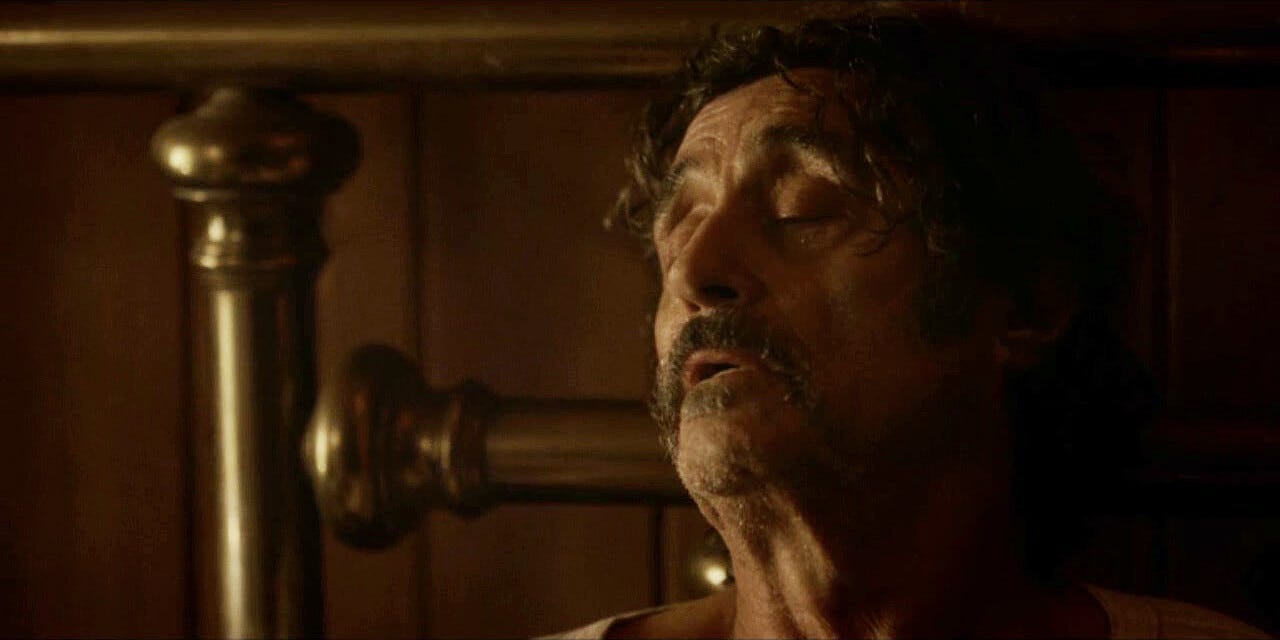
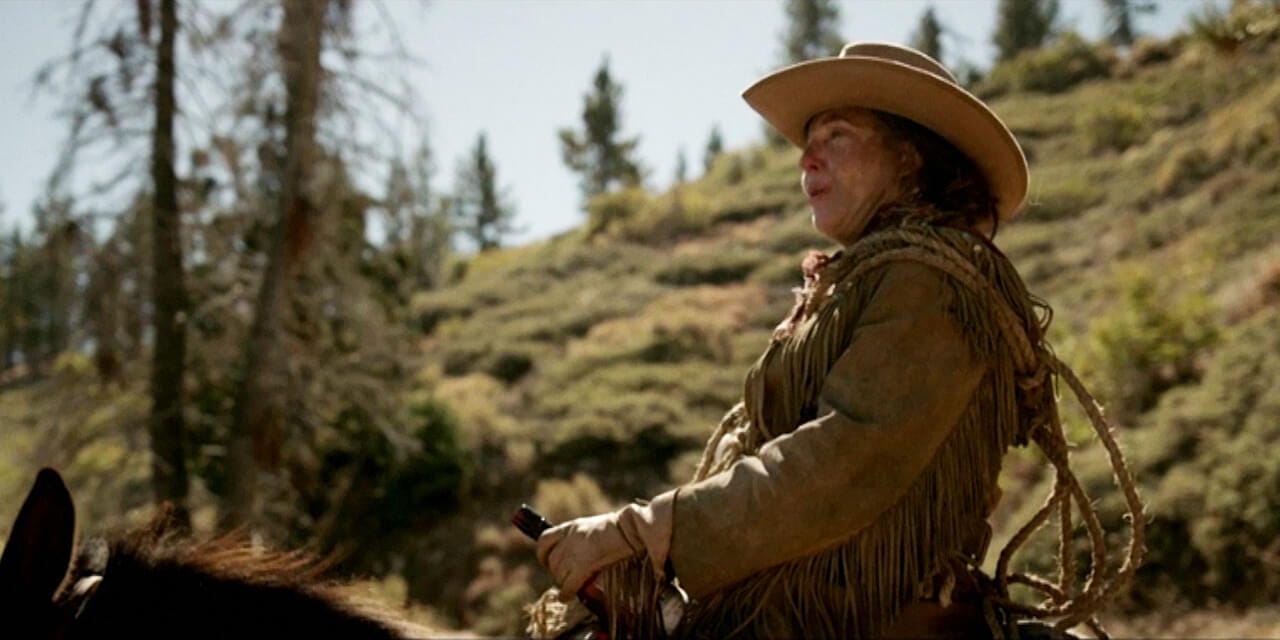
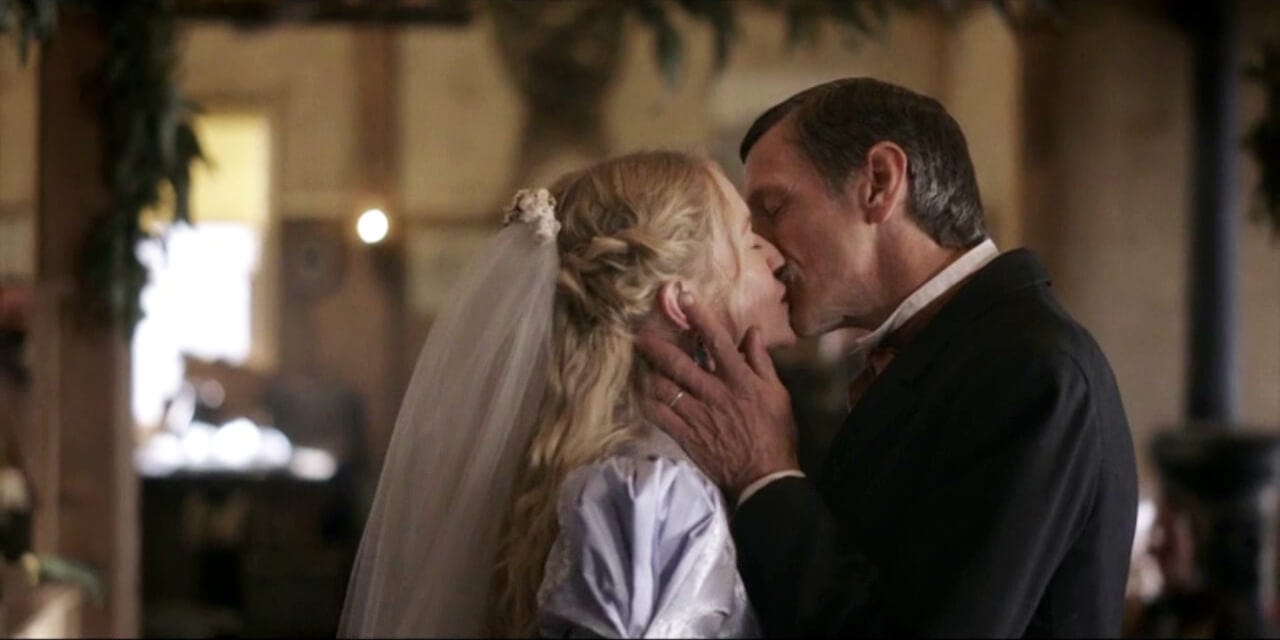
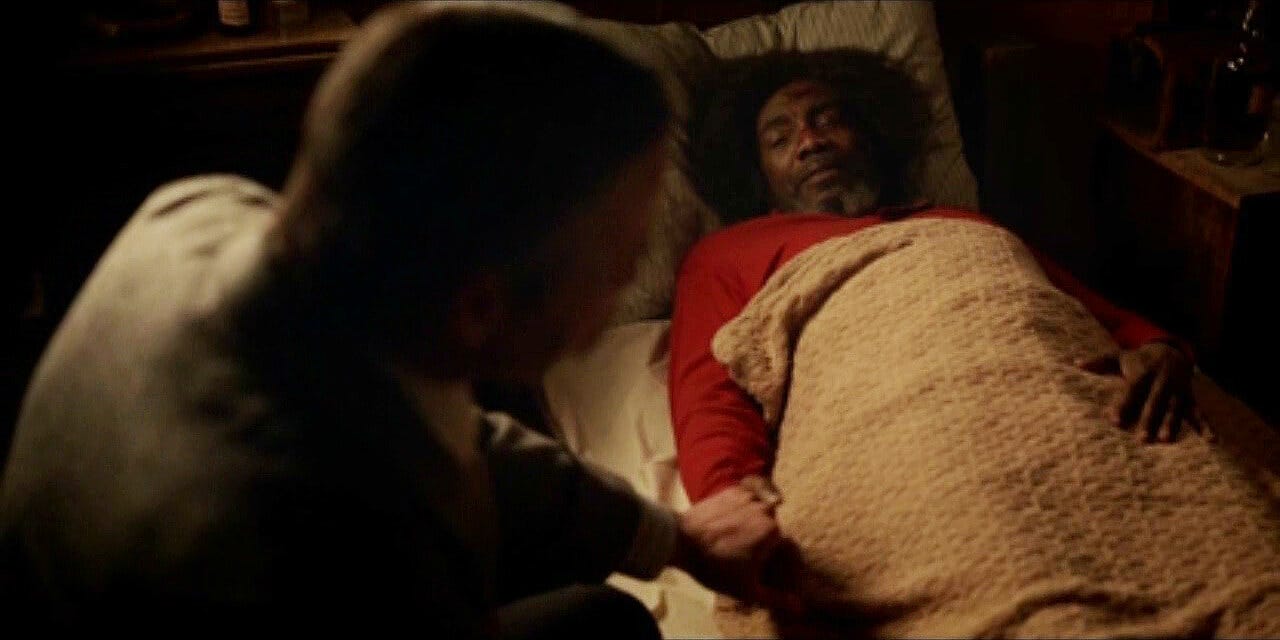
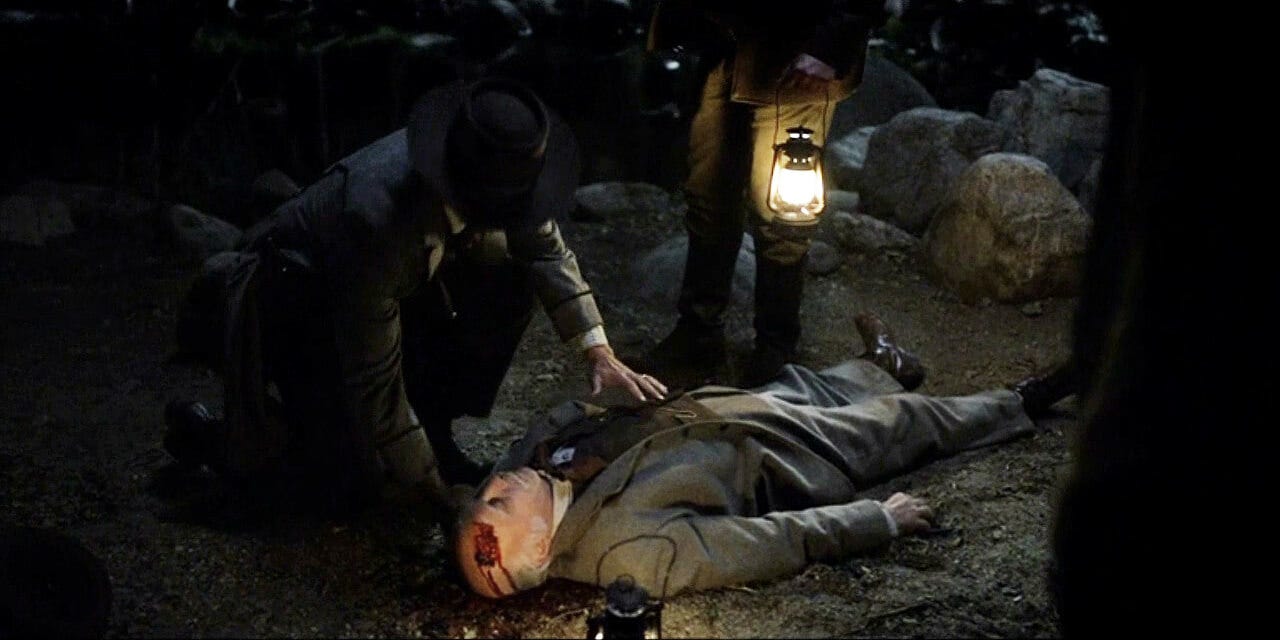
We started watching DEADWOOD because it was done by David Milch, the man who guided NYPD BLUE to its best seasons—all while limiting how far it could go thanks to his addictions and demons, along with the U.S.'s ABC Television Network's/Disney's limitations. (I've always wondered just how much of a self-portrait of Milch Dennis Franz's Andy Sipowicz was.) My then-wife and I really wanted to see what Milch would do when he wasn't coked out of his skull, and was released from broadcast network censorship.
The first half of Season One was pretty rough going as it often felt like "No more Standards and Practices! I can show all the tits and blood I want!!!!" But we stuck with it, largely thanks to the one-two punch of Timothy Olyphant's Seth Bullock and Ian McShane's Al Swearengen—the not-so-holy Angel and the not-always-Evil Devil on the town's shoulders. Also, because of the Shakespearean sound of Swearengen's—well, swearing! (Nobody else could add so many levels of meaning to "Cocksucker!" as McShane could.)
To my surprise, both Seth Bullock and Al Swearengen were historical figures in Deadwood—though the series and the movie spare us history's conclusion to their arc, where some reports claim reformer Sheriff Seth Bullock gunned Swearengen down in the streets of Denver while trying to serve an warrant for his arrest, and others claim Swearengen was found murdered in the streets of Denver, killer or killers unknown. I'd be curious to know if Milch had originally intended the series to end with Bullock killing Swearengen as a sort of "end of the Wild West" for the town of Deadwood, then changed his mind when he fell in love with writing Swearengen's dialogue and hearing McShane deliver it.
Absorbing essay on this complex, abandoned (ironic) tribe in the wilderness.